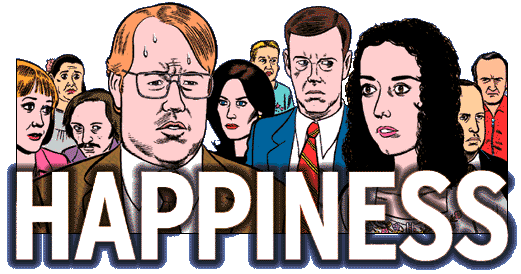![[safe]](safe.gif)

Happiness

Starring Jane Adams, Dylan Baker, Lara Flynn Boyle, Ben Gazzara,
Philip Seymour Hoffman, Louise Lasser, Camryn Manheim, Cynthia Stevenson
Directed by Todd Solondz
![[safe]](safe.gif)


Todd Solondz despises surburbanites - this fact was clearly established with his debut feature, the savagely funny “Welcome to the Dollhouse”, and in “Happiness”, he continues his examination of the travails and triumphs of a group of inhabitants in the garden state of New Jersey.
The film concerns three sisters and the various men in their lives. There is Trish (Cynthia Stevenson), the eldest who seemingly has it all with her therapist husband William (Dylan Baker), three adorable children and a house in the suburbs. Unknown to her, William has been indulging in some twisted pursuits - namely pedophilia - and is on the brink of self-destruction. Oblivious to her own problems, Trish delights in pointing out the faults of her youngest sister Joy (Jane Adams), an indecisive, timorous soul who runs her life as if she were an advertisement on how not to live independently; flitting from one dead end relationship to another, one unfulfilling job to another, Joy constantly finds herself on the receiving end of Trish’s veiled sarcastic comments. Then there’s Helen (Lara Flynn Boyle), the bossy middle sister who’s a pretentious poet driven to doubts over her undeserved fame and success. Helen’s neighbor, Allen (Philip Seymour Hoffman), nurses an overwhelming crush on her that soon drives him to making obscene phonecalls. He in turn is pursued by Christina (Camryn Manheim), another neighbor who harbors her own dark secrets. Presiding over the brood of desperately unhappy sisters is their insensitive, uncaring father (Ben Gazzara) and tearful, fragile mother (Louise Lasser), themselves on the brink of a divorce.
Around this clan of isolated and miserable characters, Solondz waves a steady directorial hand, expertly guiding the proceedings with minimal haste and confidently allowing his hot-button issues to take small, personal forms onscreen so that they become subjects which the audience can relate to. The film’s most controversial aspect - the pedophiliac father and his disturbing and somewhat creepy relationship with his adolescent son - has been widely written about. Solondz, as writer and director, manages to toe a fine line so that the entire matter is handled tastefully, thoughtfully and objectively (if an objective perspective is possible), and he elicits a marvellous performance from Dylan Baker as the monstrously human William.
In fact, Solondz continues to show that he has a special way with actors; the entire cast, from the typecast Philip Seymour Hoffman (playing yet another sexually frustrated, pathetic misfit) to the stunt appearance of Jon Lovitz and Marla Maples (!) are expertly directed to create a film made up of great ensemble work. Camryn Manheim has a marvellous supporting role as a woman coping with a horrific experience and a lifetime of rejection, and Cynthia Stevenson is particularly effective as the self-congratulatory, self-deluding Trish - what could have been an irritating character turns into a real, slightly sympathetic woman. Lasser and Gazzara display a lot of spirit as the aging parents fighting loneliness and bitterness, although Gazzara’s turn in Vincent Gallo’s “Buffalo 66” was a much better performance. Jane > Adams plays the doormat very well although one wonders why anyone would want to play such a character at all. Hoffman and Baker, as noted above, give sure performances, and Lara Flynn Boyle - who looks dangerously anorexic and anemic - continues to find the dark humor in her roles, giving her characters a rough, unexpectedly loopy edge. Her work here is an extension of her brilliant, but overlooked, performance in last year’s “Afterglow”, and was the one I enjoyed most in the film.
“Happiness” runs a little too long, and some scenes play on a little self-indulgently. The leisurely pacing, though effective in communicating a sense of everyday ordinariness, causes the film to lag at some points. When it comes alive, however, Solondz’s sophomore effort is just as wicked, droll and sharp as his sensational debut. Given the subject matter and general unpleasantness involved, these may not be people you wish to spend time with; but if you choose to do so, you’ll be glad your world is not theirs. That, in effect, seems to be the sum result of “Happiness”.